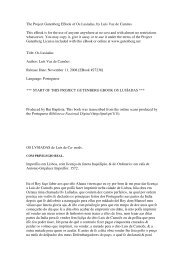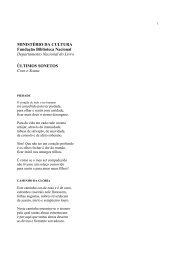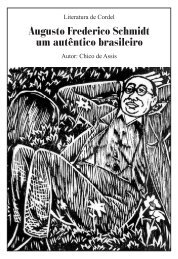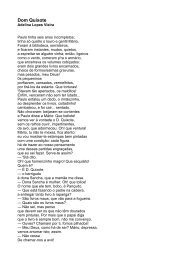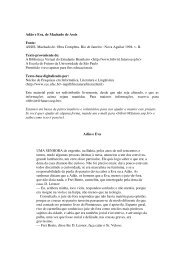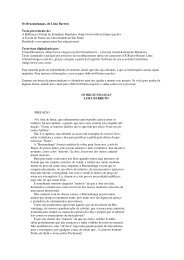- Page 1 and 2:
The Project Gutenberg EBook of La L
- Page 3 and 4:
GENERAL PREFACE Encouraged by the f
- Page 5 and 6:
which make up ordinary human charac
- Page 7 and 8:
superb lyrical expression to the th
- Page 9 and 10:
Les récits montrent l'un après l'
- Page 11 and 12:
phrases. The many variations on the
- Page 13 and 14:
gloom, corresponding to the sentime
- Page 15 and 16:
C'était la fin d'un jour d'orage,
- Page 17 and 18:
who, obnoxious to Napoleon for the
- Page 19 and 20:
Les poèmes qui composent ce volume
- Page 21 and 22:
L'auteur, du reste, pour compléter
- Page 23 and 24:
Lui dirent:—Couchons-nous sur la
- Page 25 and 26:
On mit l'aïeul au centre en une to
- Page 27 and 28:
Dieu dit:—Que te faut-il encor?
- Page 29 and 30:
Et les pattes, changeant en sphère
- Page 31 and 32:
'Voilà longtemps que celle avec qu
- Page 33 and 34:
Trimalcion foulait les os de Scipio
- Page 35 and 36:
Des torturés râlaient sur cette r
- Page 37 and 38:
Déjà, bien avant l'aube, ils comb
- Page 39 and 40:
Car j'ai soif. —Fils, merci, dit
- Page 41 and 42:
Le jour naît, le combat continue
- Page 43 and 44:
—Roncevaux! Roncevaux! ô traîtr
- Page 45 and 46:
Quant à nous, autrefois, c'est vra
- Page 47 and 48:
—Hugues, dit-il, je suis aise de
- Page 49 and 50:
Tout l'or de Salomon et tout l'or d
- Page 51 and 52:
L'empereur fit le tour de tous ses
- Page 53 and 54:
Qui remplirent longtemps la terre d
- Page 55 and 56:
BIVAR Bivar était, au fond d'un bo
- Page 57 and 58:
Lerme était votre archer; Gusman,
- Page 59 and 60:
Comme il se reposait dans le hallie
- Page 61 and 62:
De Colmar et la chaîne au pied de
- Page 63 and 64:
Avec l'éclair qui frappe et fuit c
- Page 65 and 66:
Aptar où croît le pin, Toxis que
- Page 67 and 68:
Barletta dans la Pouille, et Crême
- Page 69 and 70:
Elle est gaie, étourdie, imprudent
- Page 71 and 72:
L'empereur fait la guerre à l'ordr
- Page 73 and 74:
Qu'est-ce que tout cela fait aux ar
- Page 75 and 76:
Passer sur le hallier par l'été r
- Page 77 and 78:
Les cavaliers sont froids, calmes,
- Page 79 and 80:
Là sont des ducs sanglants et les
- Page 81 and 82:
Tous ces êtres, dragons, cerbères
- Page 83 and 84:
—Page, dit ce chercheur d'aventur
- Page 85 and 86:
On entend frissonner et vibrer moll
- Page 87 and 88:
'Allons-nous-en par la terre, Sur n
- Page 89 and 90:
Tous ces bonshommes noirs sont des
- Page 91 and 92:
La traîna toute nue en la céleste
- Page 93 and 94:
Pour un oui, pour un non, pour un d
- Page 95 and 96:
D'où plus d'un fleuve sort, où pa
- Page 97 and 98:
Ce que le mont Corbus cache sous so
- Page 99 and 100:
La voix de fer parlant sous le gril
- Page 101 and 102:
Vous avez la puissance et vous avez
- Page 103 and 104:
A quoi bon vous parler de ce que vo
- Page 105 and 106:
Le preux ouvre son casque, et hors
- Page 107 and 108:
—Hé! dit-il, je n'ai pas besoin
- Page 109 and 110:
Sortait, et s'épandait sur la terr
- Page 111 and 112:
D'Aden et d'Erzeroum il fit de larg
- Page 113 and 114:
Chacun de ses rayons entrait comme
- Page 115 and 116:
Et, comme notre aurore, un sanglot
- Page 117 and 118:
Ce brumeux tourbillon de spectres,
- Page 119 and 120:
Ce turbé que Bagdad montre encore
- Page 121 and 122:
L'enfant est Isora de Final, hérit
- Page 123 and 124:
Fier, levant dans la nuit son cimie
- Page 125 and 126:
A présent un enfant est toute sa f
- Page 127 and 128:
Tous les ans, les alleux, les rente
- Page 129 and 130:
Sire, vois ce corbeau, dit une sent
- Page 131 and 132:
L'herbe et la sauge en fleur jonche
- Page 133 and 134:
De façon que cela tombe dans leur
- Page 135 and 136:
Les servantes chaussaient ces pieds
- Page 137 and 138:
Prélats parmi les ducs, moines par
- Page 139 and 140:
Une odeur de tuerie et de cadavres
- Page 141 and 142:
Mais l'être intelligent, le fils d
- Page 143 and 144:
Lion, tu vas japper ainsi qu'un ép
- Page 145 and 146:
Formidable, il arrache au brodequin
- Page 147 and 148:
Ces femmes, pour venir prendre un e
- Page 149 and 150:
Et qu'emplir de soleil nos pauvres
- Page 151 and 152:
Et son cou d'où sortait, dans un b
- Page 153 and 154:
La magnifique fleur, royale et purp
- Page 155 and 156:
Il rôde d'une chambre à l'autre,
- Page 157 and 158:
Toujours vêtu de noir, ce tout-pui
- Page 159 and 160:
Ont leur besogne à faire et n'y sa
- Page 161 and 162:
Que le soir frémissant jette à tr
- Page 163 and 164:
Toujours entre ses dents un cadavre
- Page 165 and 166:
Le mariage la ferma. En partant du
- Page 167 and 168:
En partant du golfe d'Otrante, Nous
- Page 169 and 170:
En partant du golfe d'Otrante, Nous
- Page 171 and 172:
Pas de monstre chétif, louche, imp
- Page 173 and 174:
Lavant la cruauté de l'homme en ce
- Page 175 and 176:
Maîtrisant du fardeau l'affreuse c
- Page 177 and 178:
Au fond, dans l'encoignure où quel
- Page 179 and 180:
Ouvre aux âmes, essaims d'autours
- Page 181 and 182:
Allons!—Et la voilà qui part. L'
- Page 183 and 184: VII Comme ils dorment tous deux dan
- Page 185 and 186: Puis elle demeura pensive et frisso
- Page 187 and 188: Ils doivent avoir peur tout seuls a
- Page 189 and 190: Pleins jadis d'une foudre, et qui,
- Page 191 and 192: Un prodigieux câble ourlait sa gra
- Page 193 and 194: On voyait flamboyer son colossal be
- Page 195 and 196: En Amérique, un autre à Londre, u
- Page 197 and 198: Le haut d'une montagne a, sous l'or
- Page 199 and 200: Et la locomotive est reptile, et, s
- Page 201 and 202: L'aéroscaphe suit son chemin; il n
- Page 203 and 204: Ce navire est un Louvre errant avec
- Page 205 and 206: Andromède étincelle, Orion resple
- Page 207 and 208: Puis quand il a fallu vaincre l'éc
- Page 209 and 210: Le mensonge, le dol, les brumes, le
- Page 211 and 212: A l'avenir divin et pur, à la vert
- Page 213 and 214: Tout l'ancien joug, de rêve et de
- Page 215 and 216: Qui lève l'ancre et sort de l'ombr
- Page 217 and 218: Que ce buccin fatal, qui rêve et q
- Page 219 and 220: Et se dresser, et prendre à la hâ
- Page 221 and 222: Au-dessus des forfaits et des apoth
- Page 223 and 224: Fuyaient. Le clairon sombre ouvrait
- Page 225 and 226: Et fut marqué au front affin qu'en
- Page 227 and 228: Hugo appears to have had a feeling
- Page 229 and 230: soldiers proclaimed another emperor
- Page 231 and 232: Roland's sword, Durandal, which was
- Page 233: The following are a few typical ins
- Page 237 and 238: l'ordre teutonique, the Order of Te
- Page 239 and 240: Et le bien bondissant effare ceux q
- Page 241 and 242: It does not seem probable that Hugo
- Page 243 and 244: (sac), whence the name was derived.
- Page 245 and 246: L. 455. A peacock roasted whole and
- Page 247 and 248: premiers temps de la conquête. Tou
- Page 249 and 250: which I am indebted to Edmond Hugue
- Page 251 and 252: L.53. The vessel pitches as she mee
- Page 253 and 254: Délos. Tradition says that Delos i
- Page 255 and 256: Hobbe. Thomas Hobbes (1588-1679), t
- Page 257 and 258: Les Contemplations. Paris, 1856. La
- Page 259 and 260: ***** This file should be named 121
- Page 261 and 262: almost no restrictions whatsoever.
- Page 263 and 264: Gutenberg-tm electronic work under
- Page 265 and 266: particular state visit http://pglaf




